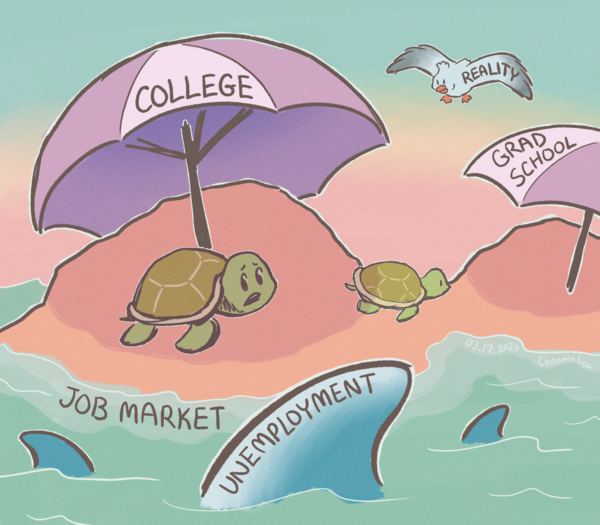As I enter my senior year at KAIST, I’m forced to face a question I’ve been dreading for years now: “What are you going to do after you graduate?” I’m sure most of you have thought of the same thing. While some are lucky enough to know what they truly want with absolute certainty, others, like me, are left dreading the day an answer is required.
There are generally two courses of action to consider: go to graduate school or find a job. The simpler choice for most of us is to go to graduate school, and it’s not difficult to see why. Generally speaking, KAIST students grew up in an academic environment for the majority of their lives. It is that upbringing that led us to an institute with such a focus on science and research, so it is only natural that we are inclined to pursue further education. Graduate school signifies specialization and further mastery of knowledge, but it also represents comfort and familiarity. Though it may not be exactly the same, our purpose of attending graduate school is one we have known for as long as we can remember — to study.
The pursuit of knowledge is admirable, but what scares me about graduate school is that I might end up doing it for the wrong reasons. Instead of doing my best to get into a program that I am passionate about, what if I enter a program that I am deemed sufficiently capable of just to remain in a familiar environment? I need to be certain that what I choose to do is all in the name of a larger goal, not just a means to dodge a question I am afraid of answering. Countless anecdotes of people regretting going to graduate school for the wrong reasons are more than enough reasons for all of us to truly think about our decision when it’s time to make it.
Unfortunately, or fortunately depending on how you look at it, the other course of action — finding a job — seems like such a bleak proposition now that graduate school appears to be a necessary qualification. Obviously, graduate school is an absolute necessity for a career in academia, which is what some of us are aiming for. However, the ever-increasingly competitive job market has also made it seem like a master’s degree is also a prerequisite for employment in any field. With so many people with a college degree fighting for the same number of limited job openings, any way to distinguish oneself from the crowd becomes a necessity, and a master’s degree performs that role for most of us.
However, despite my greatest worries, I know it is not impossible to find a job without a master’s degree. What I am struggling to reconcile now is the fact that finding a job with only an undergraduate degree is possible, but a master’s degree will hopefully make it easier. Knowing that, I fear I might end up going to graduate school out of fear (ironically) that I will never make it in the industry with a mere bachelor’s degree, without even trying first.

Pragmatically, going to graduate school just seems to be the logical choice. Whether you want to pursue a career in academia or any field, it’s easy to see the argument for how graduate school will help you either way. However, getting in is not even a guarantee in the first place, and not putting your heart into the application will only further reduce your chances of successfully making it in. Moreover, I truly believe that making a decision only because of fear of the unknown will lead to misery. Treating graduate school as a pit stop before we take a plunge into the void — that is, the real world — is not the path I want to take.

